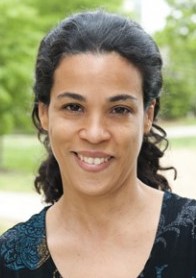Required. Summer Bridge Program (Grant Writing) – Technical Writing Workshop, Dr. Robin Farabaugh
Aug 1 – 8, 2023
In this workshop, students wrote their personal statement while learning persuasive writing skills aimed for a general scientific audience. During the 2022 course, students reviewed and used Writing Science in Plain English, by Anne E. Greene as a guide to write readable scientific text.
Required. Career exposure and professional development seminars through participation in G-RISE Career Talks and Monthly Meetings
Offered monthly through Fall and Spring semesters
Required. Quantitative Workshop – Introduction to Genomics with Python, Dr. Ivan Erill
January 23 – 27, 2023
 This workshop introduces genomics using the Python programming language. The workshop assumes no background knowledge in programming, or the computational techniques used in genomics. It does assume some working knowledge of basic molecular biology terms and concepts. This workshop will familiarize G-RISE trainees with the concepts of rigor (in designing and performing scientific research) and reproducibility of research findings, which are the cornerstone of the scientific method. Emphasis will be placed on the application of rigor to ensure robust and unbiased experimental design, methodology, analysis, interpretation, and reporting of results, as they pertain to biomedical research.
This workshop introduces genomics using the Python programming language. The workshop assumes no background knowledge in programming, or the computational techniques used in genomics. It does assume some working knowledge of basic molecular biology terms and concepts. This workshop will familiarize G-RISE trainees with the concepts of rigor (in designing and performing scientific research) and reproducibility of research findings, which are the cornerstone of the scientific method. Emphasis will be placed on the application of rigor to ensure robust and unbiased experimental design, methodology, analysis, interpretation, and reporting of results, as they pertain to biomedical research.
- Introduction to experimental design (how to get started)
- Key elements of experimental design (variables, controls, sample size, replication)
- Accounting for personal bias (use of rigor and transparency to safeguard against personal biases)
- Gearing up to do the experiment (best practices on becoming familiarized with a protocol, validate key reagents, and keep a good laboratory notebook)
- Getting the experiment to work (tips and best practices on how to pilot, troubleshoot, and optimize an experiment).
Required. Ethics in Scientific Research – BIOL 397: Ethics and Integrity in Scientific Research – OR – CHEM 714: Ethics in Current Chemical Biochemical Research
Courses are offered in Fall and Spring semesters
G-RISE/NIH trainees are expected to receive instruction on the Responsible Conduct of Research. Fellows may either register for BIOL 397 in the Spring, CHEM 714 in the fall, or may take a similar class approved by G-RISE leadership to satisfy this requirement.
BIOL 397: Ethics and Integrity in Scientific Research
Individuals involved in contemporary scientific research have ethical responsibilities for their conduct. The goal of this course is to provide students considering a career in scientific research with a framework for establishing appropriate scientific integrity. A variety of relevant topics will be discussed, including fraud and misconduct, peer review, obligations and rights of students and mentors, ethical conduct in animal and human experimentation, ownership of data, reagents, intellectual property, authorship and conflict of interest.
CHEM 714: Ethics in Current Chemical Biochemical Research
This core course will be given to students in their first or second year in the graduate program. It will entail a combination of weekly departmental seminars on current research in chemistry/biochemistry by experts around the country/world in combination with hour long weekly discussions of critical ethical topics to researchers. The combined course format of seminar and ethics will allow graduate students to apply what they have learned in weekly ethics discussions to potential case studies (both theoretical and those from current research efforts presented in seminars).
Required. Enhancing Reproducibility Workshop, Dr. Rachel Brewster
Spring, Date TBD
 Offered for the first time in Spring 2024. The date and time of this course will be announced soon.
Offered for the first time in Spring 2024. The date and time of this course will be announced soon.
Increasing concerns about the inability to reproduce published biomedical research have raised questions within the research community and among public stakeholders (Landis et al. 2012). Federal agencies that support research activities, including the National Institutes of Health (NIH) (Colins and Tabak (2014) and the
National Science Foundation, have set in place new policies to address these concerns. According to the Federation of American Societies for Experimental Biology (FASEB) 2016 Report on Enhancing Research Reproducibility, three problems impede the ability to reproduce results. The first pertains to the lack of uniform definitions to describe the problem (replicability, reproducibility, generalizability, translatability, rigor, transparency). The second concerns insufficient reporting of key experimental details: lack of sufficient detail in the reporting of critical materials or methods. The third (and most relevant to this G-RISE application) has to do with gaps in scientific training. FASEB recommendations with respect to training are to reinforce good practices for the maintenance of complete experimental records and laboratory notebooks; the use of precise definitions and standard nomenclature for the field or experimental modeling; the critical review of experimental design, including variables, metrics, and data analysis; the application of appropriate statistical methods; and complete and transparent reporting of findings.
This G-RISE application aims to provide instruction for enhancing reproducibility across the curriculum with a new course on Methods for Enhancing Reproducibility, additional graduate-level coursework and journal clubs, and direct mentoring on thesis research (see below). NEW Course on Methods for Enhancing Reproducibility. All G-RISE trainees will be required to participate in a mandatory, semester-long course on Methods for Enhancing Reproducibility that will be taught once per week (see Course Syllabus in Appendix). UMBC students in the NIH-funded undergraduate U-RISE Program and graduate CBI (Chemistry-Biology Interface) Program will also have the option to enroll in this course, as will PhD students in the department of Biological Sciences and the department of Chemistry, Biochemical and Environmental Engineering (CBEE).
Required. Mentoring, Jennifer AumIller
February 7 – 28
 The mentoring workshop is a series of four 90 minute online meeting that is offered a few times per year.
The mentoring workshop is a series of four 90 minute online meeting that is offered a few times per year.
Jenn Aumiller, MeD, Director of GPILS/OPS Career and Professional Development and the Director of the Office of Postdoctoral Scholars at the University of Maryland School of Medicine and Blessing Enekwe, PhD, Director of the Office of Postdoctoral Scholars at the University of Maryland College Park are offering another round of Faculty Mentoring Workshops.
This series of discussions is part of the Entering Mentoring Series which was developed at the University of Wisconsin, Madison by Pfund, House, Asquith, Spencer, Silet, and Sorkness. The content of each session in the curriculum is designed to address the key concerns and challenges identified by research mentors that train graduate students and postdoctoral fellows.
February Sessions will run from 10:30-12:00 on Zoom.
February 7 – Introduction and Effective Communication
February 14 – Aligning Expectations and Assessing Understanding
February 21 – Addressing Equity and Inclusion
February 28 – Supporting Independence and Promoting Professional Development
Elective. Teaching, Dr. Sarah Leupen
July 10 – 14, 2023, 9 am – 12 pm
Training and experience in education is an essential skill especially those aspiring to become science educators or academic researchers. Despite the fact that most students at UMBC deliver part of the curriculum as teaching assistants for one semester or more, these opportunities seldom offer any additional pedagogical training. Dr. Sarah Leupen has received several recognitions and awards for her excellence in teaching, including a Fulbright scholarship in 2016-2017 to work with faculty at the Charles University in the Czech Republic to increase the use of evidence-based pedagogies and to design Scholarship of Teaching and Learning projects.
This workshop will be organized in modules that provide content on current undergraduate science pedagogy and hands-on practice to enable trainees to become effective educators in STEM. Topics covered will include: 1) student motivation for learning, 2) inclusive teaching, 3) evidence-based teaching and classroom assessment techniques. Students participating in this workshop will acquire foundational knowledge in teaching pedagogy. Practical outcomes include the draft of a teaching statement and a Center for the Integration of Research, Teaching and Learning (CIRTL) associate certificate that will enhance their employment prospects as STEM educators. Check out Dr. Leupen’s bio and list of recommended teaching literature.